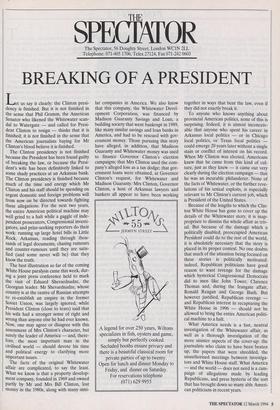SPECT TIE AT OR The Spectator, 56 Doughty Street, London WC1N 2LL
Telephone: 071-405 1706; Telex 27124; Fax 071-242 0603
BREAKING OF A PRESIDENT
Let us say it clearly: the Clinton presi- dency is finished. But it is not finished in the sense that Phil Gramm, the American Senator who likened the Whitewater scan- dal to Watergate — and called for Presi- dent Clinton to resign — thinks that it is finished; it is not finished in the sense that the American journalists baying for Mr Clinton's blood believe it is finished.
The Clinton presidency is not finished because the President has been found guilty of breaking the law, or because the Presi- dent's wife has been definitively linked to some shady practices at an Arkansas bank. The Clinton presidency is finished because much of the time and energy which Mr Clinton and his staff should be spending on urgent domestic and foreign problems will from now on be directed towards fighting these allegations. For the next two years, the entire American political machine may well grind to a halt while a gaggle of inde- pendent prosecutors, Congressional investi- gators, and prize-seeking reporters do their work: running up large hotel bills in Little Rock, Arkansas, reading through thou- sands of legal documents, chasing rumours and counter-rumours until they are satis- fied (and some never will be) that they know the truth.
The best illustration so far of the coming White House paralysis came this week, dur- ing a joint press conference held to mark the visit of Eduard Shevardnadze, the Georgian leader. Mr Shevardnadze, whose country is at the centre of Russian attempts to re-establish an empire in the former Soviet Union, was largely ignored, while President Clinton (close to tears) said that his wife had a stronger sense of right and wrong than anyone else he had ever known. Now, one may agree or disagree with this assessment of Mrs Clinton's character, but surely the leader of America — and, there- fore, the most important man in the civilised world — should devote his time and political energy to clarifying more important issues.
The facts of the original Whitewater affair are complicated, to say the least. What we know is that a property develop- ment company, founded in 1969 and owned partly by Mr and Mrs Bill Clinton, lost money in the 1980s, along with many simi- lar companies in America. We also know that this company, the Whitewater Devel- opment Corporation, was financed by Madison Guaranty Savings and Loan, a building society that went bankrupt in 1989, like many similar savings and loan banks in America, and had to be rescued with gov- ernment money. Those pursuing this story have alleged, in addition, that Madison Guaranty and Whitewater money was used to finance Governor Clinton's election campaigns; that Mrs Clinton used the com- pany's alleged loss as a tax dodge; that gov- ernment loans were obtained, at Governor Clinton's request, for Whitewater and Madison Guaranty: Mrs Clinton, Governor Clinton, a host of Arkansas lawyers and bankers all appear to have been working together in ways that bent the law, even if they did not exactly break it.
To anyone who knows anything about provincial American politics, none of this is surprising. Indeed, it is almost inconceiv- able that anyone who spent his career in Arkansas local politics — or in Chicago local politics, or Texas local politics could emerge 20 years later without a single stain or conflict of interest on his record. When Mr Clinton was elected, Americans knew that he came from this kind of cul- ture, just as they knew — it came out very clearly during the election campaign — that he was an incurable philanderer. None of the facts of Whitewater, or the further reve- lations of his sexual exploits, is especially relevant to Mr Clinton's current job, which is President of the United States.
Because of the lengths to which the Clin- ton White House has gone to cover up the details of the Whitewater story, it is inap- propriate to dismiss the whole affair as triv- ial. But because of the damage which a politically disabled, preoccupied American President could do to the rest of the world, it is absolutely necessary that the story is placed in its proper context. No one doubts that much of the attention being focused on these stories is politically motivated: indeed, Republican politicians have good reason to want revenge for the damage which hysterical Congressional Democrats did to men like John Tower, Clarence Thomas and, during the Irangate affair, Ronald Reagan and George Bush. But however justified, Republican revenge and Republican interest in recapturing the White House in 1996 — should not be allowed to bring the entire American politi- cal machine to a halt.
What America needs is a fast, neutral investigation of the Whitewater affair, as well as a thorough investigation of the more sinister aspects of the cover-up: the journalists who claim to have been beaten up, the papers that were shredded, the unauthorised meetings between investiga- tors and White House staff. What America — and the world — does not need is a cam- paign of allegations made by leading Republicans, and press hysteria of the sort that has brought down so many able Ameri- can politicians in recent years.


















































 Previous page
Previous page